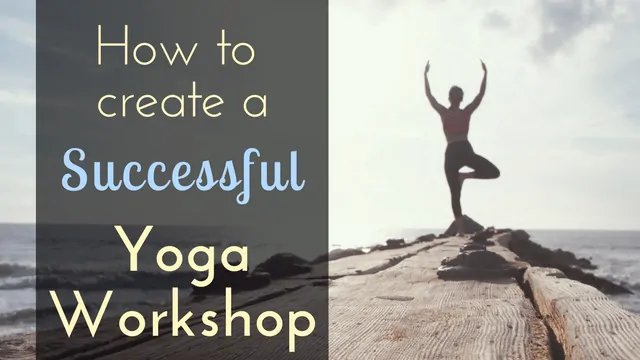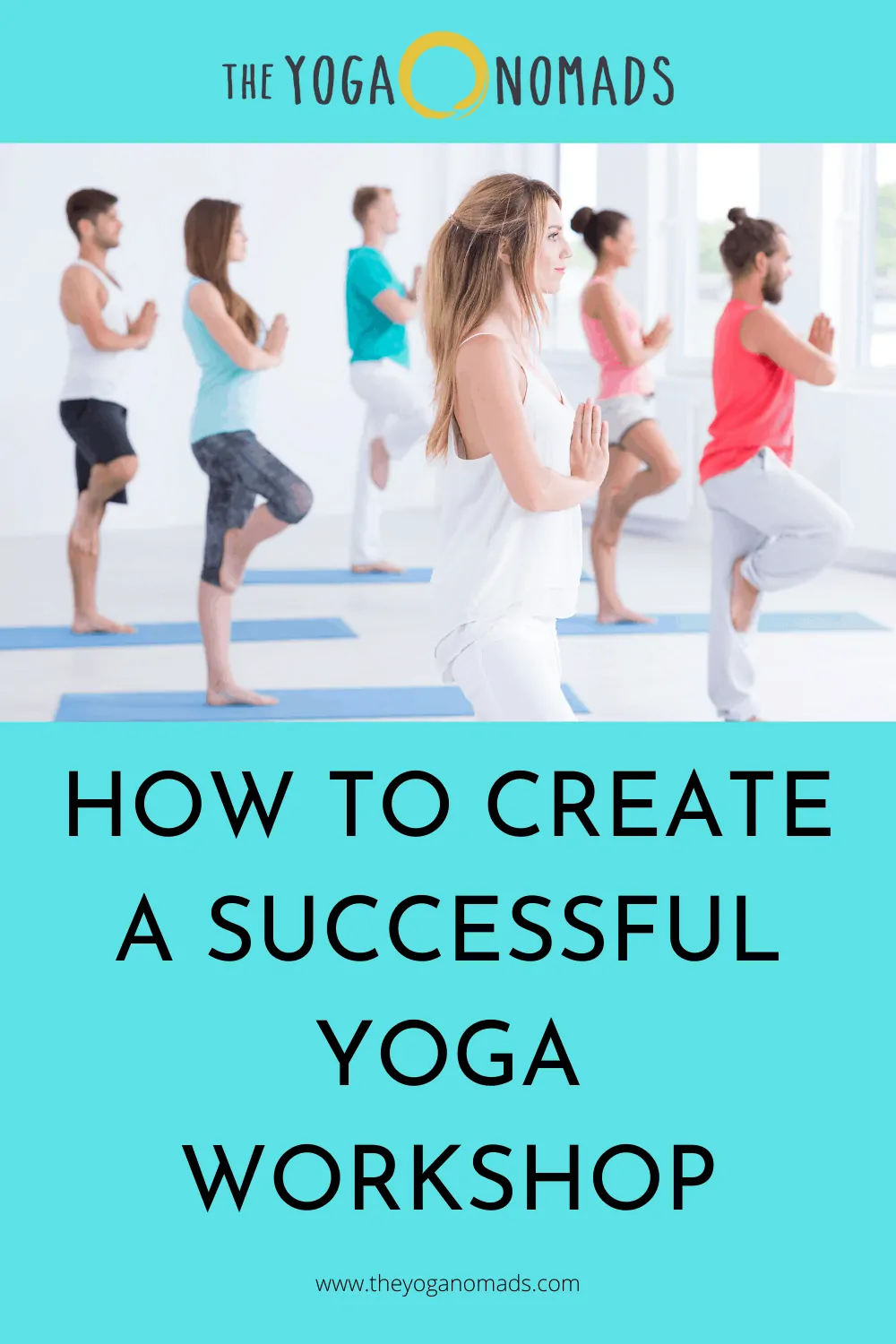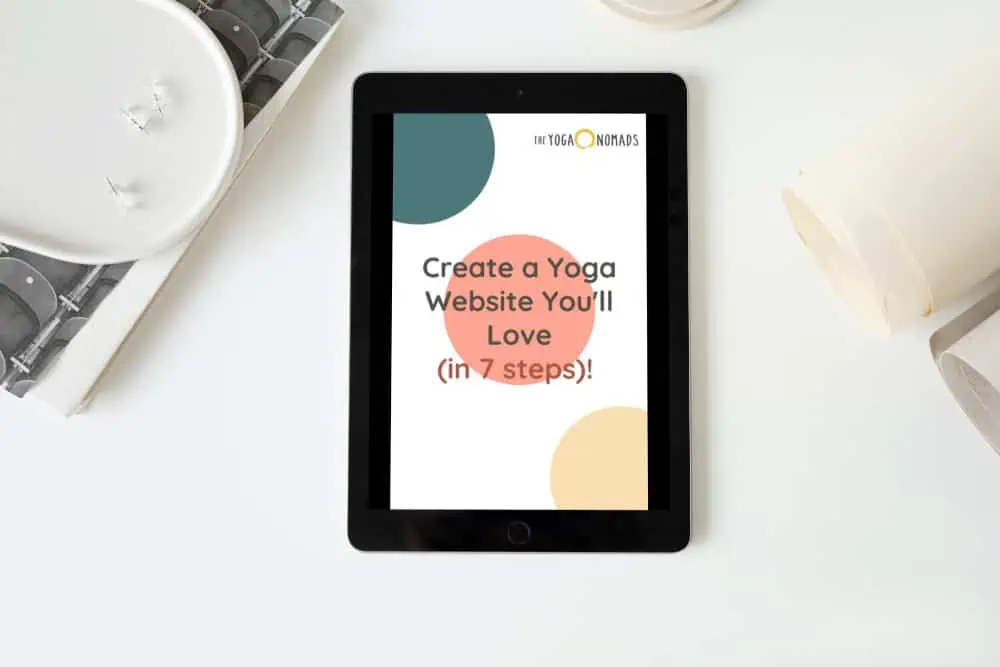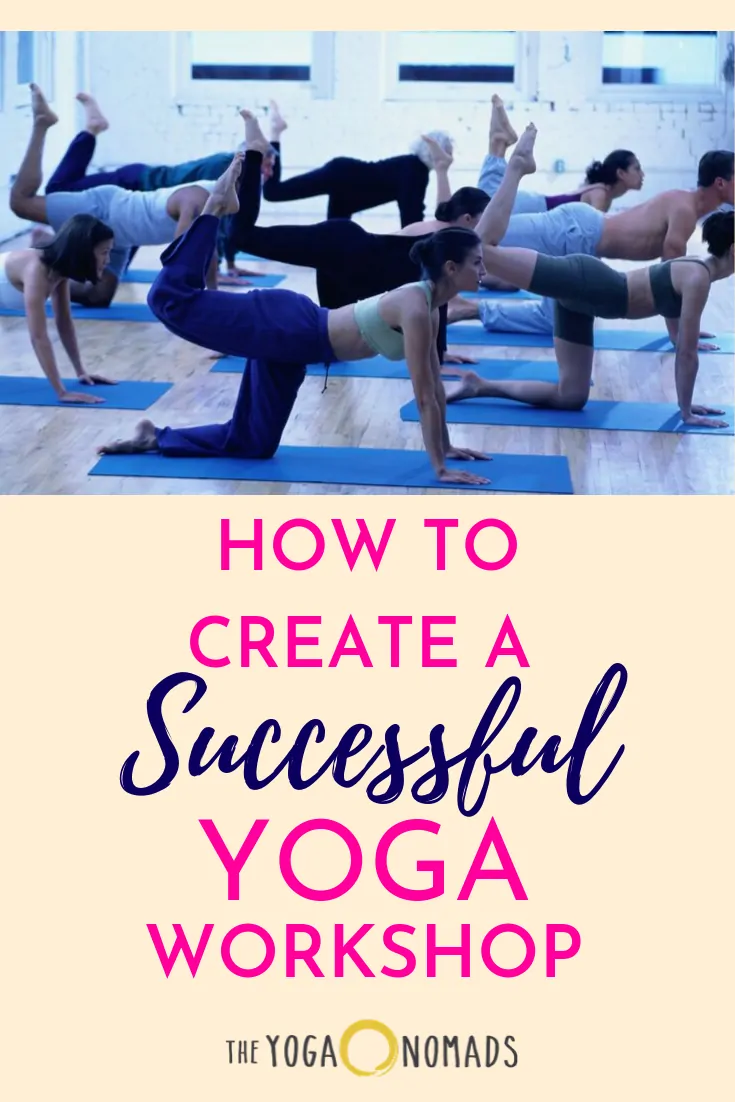Listen to this article:
Key Takeaway
Discover if you’re ready to lead a yoga workshop and how to make it successful.
“Am I ready to teach my own yoga workshop?”
As a yoga teacher, this question may cross your mind as you become more engrossed in the practice and all of its elements.
But are you ready?
Let me ask this… Is there one aspect of the practice you know inside and out? Perhaps you’re known for inversions or understanding the yamas and niyamas. Maybe giving adjustments or creating a creative flow is your specialty.
Whatever it may be, delivering a workshop on yoga is a natural next step in your yoga business. Workshops are also a great way to diversify your income as a yoga teacher.
Planning and executing a workshop takes hard work and patience. We don’t recommend attempting a workshop unless you already have a yoga website and you’ve started an email newsletter program as these are important marketing channels to ensure you fill your workshop 🙂
In this article, you will learn:
- 7 Signs You’re Ready To Lead A Workshop
- How To Choose A Topic
- Yoga workshop ideas
- How To Structure The Workshop
- How To Choose A Location
- Getting Paid
Pin me for later! 🙂
Let’s get started. 🙂
First of all…
Contents
- 1 Why Lead a Yoga Workshop?
- 2 7 Signs You’re Ready to Lead a Workshop
- 3 How To Choose a Yoga Workshop Topic
- 4 Yoga Workshop Ideas
- 5 How to Structure A Yoga Workshop
- 6 Selecting a Location for your Yoga Workshop
- 7 Getting Paid
- 8 Exploring the Fusion of Mindfulness and Meditation in Yoga Workshops
- 9 How to market your yoga workshop
- 10 Engaging Your Community: The Secret Sauce for a Fantastic Yoga Workshop
- 11 But, can I get paid well teaching workshops?
- 12 Frequently Asked Questions:
- 13 Let’s wrap up
- 14 Download our Beginners guide to create a yoga website!
- 15 Did you enjoy this article? Pin me!
Why Lead a Yoga Workshop?
With all the different types of yoga classes out there, why are workshops valuable?
Workshops are a great way to break down certain concepts, postures or themes. A standard yoga class follows a typical (somewhat rigid) structure whereas a workshop has the luxury to go DEEP into a specific topic such as arm balances, backbends, etc.
Free download: 100 Niche Ideas for Yoga Teachers
Download nowIf you excel at teaching or performing certain postures, have desire to share this knowledge with your students, AND have a good marketing strategy, then leading a workshop is for you.
Leading workshops can be a great way to earn additional income! Who doesn’t want to earn a little more money doing things they love?
Later I’ll touch on marketing strategies and how much you can expect to earn from teaching your own workshops.
Okay, but am I ready?
7 Signs You’re Ready to Lead a Workshop
You have a sincere desire to lead a workshop, but still have doubts if you’re ready.
Here are 7 signs you’re ready to lead your first yoga workshop:
- You have given significant thought to an idea and think others will benefit from it
- You’re confident with your workshop topic – you know the material inside and out
- You already have a specialty niche that you can teach outside of your regular classes
- You have a rock solid marketing plan – hint: it starts with your website/email list
- You know what issues may come up for your students and you know how to troubleshoot your students through it
- You truly want to share this offering (students can smell your passion a mile away)
- You’re looking for a way to increase your income
How To Choose a Yoga Workshop Topic
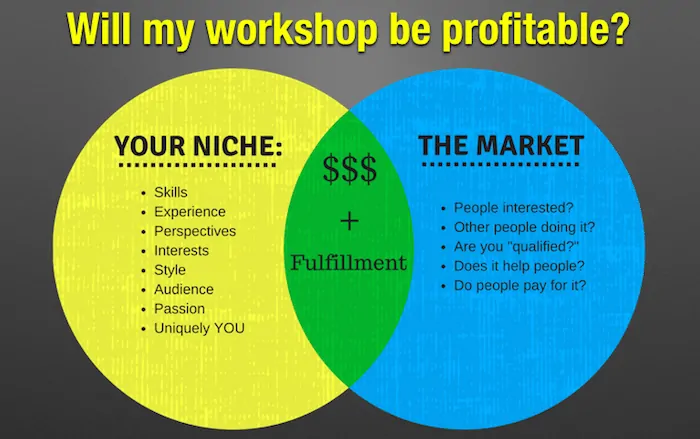
Now that you’re certain you are ready to lead a workshop, you’ll need to choose a topic.
Have you identified your yoga niche? Click here to download 100 Yoga Niche ideas to get you started.
Free download: 25 Ways Yoga Teachers can Earn More Money
Download nowNot sure what topic to focus on?
Start by asking yourself these questions:
- What is my favorite yoga pose or types of yoga poses? (Splits? Heart openers?)
- Outside of asana practice, what else do I enjoy about yoga (philosophy, meditation, etc.) and how can I relate that back to a physical yoga practice?
- What do I enjoy outside of yoga that I could fuse or make a workshop geared towards? (Yoga for Runners? Hula hoop yoga?)
- Will the venue or event I am creating this workshop for impact my idea? (i.e. yoga in a park or yoga at a music festival?)
- Are other people interested in this topic? Will they actually pay to learn XYZ?
Also, listen to what your students are saying. Is there something they are itching to learn that you think you can teach them but perhaps need more time to do so than in a normal class? Or is there something they love about the way you teach that you think you can expand upon in a workshop? These are great ways to extract ideas for your workshop.
Yoga Workshop Ideas
There are countless creative yoga workshops you can pursue. The reality is there are no best yoga workshops. Instead focus on what you’re good at combined with what your students want. Yoga workshop themes can be about quite literally anything 🙂
Here are some common examples of yoga workshops:
- Chakra Meditation
- Inversions
- Arm balances
- Backbends
- Aerial Yoga
- Intro to yoga workshop
- Acro Yoga
- Therapeutic Partner Yoga
- The business of yoga
- Something related to yoga: ayurveda, astrology, crystals, ecstatic dance
Protip: there are a million yoga event ideas… being successful is less about the idea and more about the execution. Plan strategically, listen to your students, and work hard!
How to Structure A Yoga Workshop
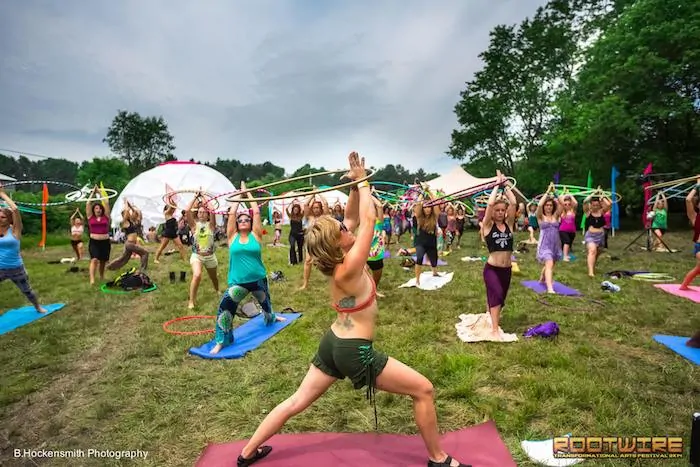
Let’s talk about how to plan a yoga workshop. Let’s be honest every good workshop has a good plan behind it! And of course, every good teacher knows when to throw that plan out the door. 🙂
Free Course: Create a Yoga Website You'll Love
(7 steps)
Enroll for Free
In my book, it’s better to over plan than under plan. Have more tools in your belt that you need. You may start an advanced handstand workshop and realize the group is not ready and you need to backtrack the foundation a little bit. Or perhaps they are more advanced and you can teach them additional transitions as a bonus. Either way, have some structure so you can find the flow.
Here is a basic outline for structuring your workshop:
- Introduction: Introduce yourself (if no one knows you) and how you came to create this workshop and what it will be about
- Warm-up: Start with a warm-up that moves through concepts you will be working on, but is unique from your regular classes (your regular clients will appreciate this)
- Substance: Get into the thick of the yoga workshop: Break down the yoga postures or techniques, which may or may not lead to a peak pose
- Play-time: Leave room for the students to explore the poses on their own, ask questions, and troubleshoot things that may come up
- Protip: Remember, you can be as creative as you want and don’t have to follow traditional yoga class sequencing
- Cool-down/Closing: Leave time for a cool down and any last questions at the end
This a standard beginner yoga workshop outline which will work for pretty much any workshop. However, don’t feel constrained to follow this exactly or at all.
Props, materials, assistants, oh my!
Consider what additional materials you can use to supplement your class. Do you have a worksheet to give to each student where they can continue what they learned?
Are there any props you will need to bring to the studio? Do you need a white board / easel or any other presentation props? Do you need an assistant?
Protip: Collaborate with another teacher.
Partnering up with another yoga instructor is great way to get started with workshops. Ideally you would partner with a teacher who has already run a workshop.
This is a great way to minimize your risks (split studio fees, both teachers spend time marketing, etc). If you have a fellow instructor that you vibe with, see if there is something unique you both can bring to the table and collaborate on.
For example, partner yoga and acro-yoga are obvious ones where team teaching can work, but other examples could be taking turns demo-ing, spotting, cueing, and adjusting poses throughout a workshop.
Learn to Create a Website for Your Yoga Business
Enroll for FreeSelecting a Location for your Yoga Workshop
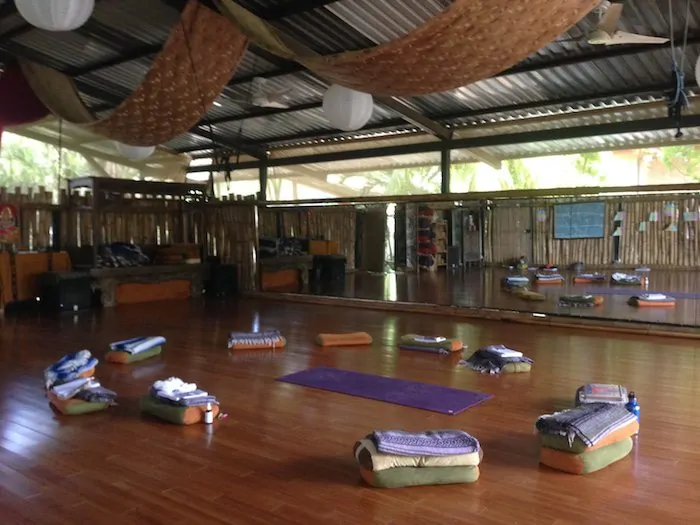
So you nailed down your yoga workshop ideas and learned how to execute it, but where? You have a couple standard options to choose from…
Option #1: Your home studio
The upside is that people already know you, you may even get some new students from other classes, and marketing will likely be easier as the studio MAY help with things like flyers and promotion (although at the end of the day, the studio will expect you to do your own marketing).
Option #2 Another venue
Using other venues such as another yoga studio or movement-oriented space you could rent is another option, however, they both come with their ups and downs. For both, you will be 100% in charge of marketing. Highly recommended that you have a website + email list + active socials before attempting a workshop at a 3rd party venue.
Things to consider:
- Will you be renting the space or is it a percentage split? Rental fees are usually dependent on the area. Percentage splits are typically 70/30 or 60/40, with the majority going to you.
- Is there an existing clientele of the venue you can market to? If so, what are their class numbers like or how popular is the venue?
- Will the venue help you promote it?
- Is the space big enough, does it have the props you need or anything special that is specific to what you are teaching?
- Is the venue in a good location that is accessible? Is there adequate parking?
Getting Paid

The details yoga teachers dread! How much should you charge? How many people need to come?
Things to consider:
- What is best day of the week and time do this workshop? Weekends are generally the right choice.
- How long will your workshop be? Depending on the topic, they are usually longer than typical classes, but no longer than 3 hours without a break.
What about pricing?
- Choose a price per head that is fair according to your rental fee or split and that also compensates you fairly for your time.
- Typically workshops cost between $25-50 per person. (consider an early bird discount of ~25% off)
- How many hours is the workshop?
- How many people can the space hold?
- How many people do you need to come to break even and make a profit?
Exploring the Fusion of Mindfulness and Meditation in Yoga Workshops
While yoga naturally encourages mindfulness setting aside a portion of the workshop to teach and engage in mindfulness and meditation techniques can offer benefits.
This method does not only enrich the practice but also equips attendees with tools they can apply beyond the yoga studio to cope with stress and improve their overall well-being.
Mindfulness practices in yoga workshops may commence with exercises focusing on breath awareness. These activities aid participants in attuning themselves to their breath an element of both yoga and mindfulness disciplines.
By concentrating on their breath participants can grasp how to ground themselves in the moment, which lies at the core of mindfulness.
Another area worth exploring is movement. This entails executing yoga postures while fully conscious of movements and sensations devoid of judgment.
It fosters a bond between the mind and body enhancing the advantages of yoga alongside the mental clarity that comes with practicing mindfulness.
Integrating meditation into workshops can manifest in diverse ways, from guided visualizations that align with the workshop theme to meditation sessions that enable participants to delve into their world.
Practicing meditation methods, like loving kindness or gratitude meditations can be beneficial as they provide individuals with techniques to nurture feelings and inner strength.
Incorporating mindfulness and meditation practices into yoga sessions creates an experience that caters to individuals’ well-being, including their physical, mental, and emotional health.
This approach distinguishes your workshop. Equips participants with tools, for leading a more mindful and harmonious life.
How to market your yoga workshop
- Your goal should be to break even with signups at least before the event starts. This means offering an early bird discount and marketing it like crazy leading up to the event.
- Plan your event at least 1 month in advance (you don’t want to scramble last minute to do everything)
- Setup a way to accept early payment and for early bird signups (Stripe, Paypal, or Venmo will work)
- Write a blog post and market the event all over your yoga website
- Create scarcity – remind people there are a limited number of spaces and give warnings as it fills up
- Demonstrate “social proof” – when people sign up, ask them if you can use their name/picture to use in your marketing. Social proof inspires others to sign up. (example social media update with a picture of sally: “Sally from Minneapolis just signed up. She’s been practicing yoga for 3 years and her favorite pose is crow pose).”
- Send out a couple newsletters to your email list (if you haven’t started an email newsletter program, you should, it’s free to start. We recommend ActiveCampaign – they offer a free trial and it starts at only $29/month after that. ConvertKit is another popular option with a free tier for up to 1,000 subscribers.
- Create a Facebook event – invite everyone in the area
- Share your event through all of your social media outlets
- Create a catchy title for your workshop
- Design a flyer and hang them in the venue and at nearby coffee shops, etc.
Engaging Your Community: The Secret Sauce for a Fantastic Yoga Workshop
When I reflect on what sets a yoga workshop apart, it’s not just about the poses or the overall theme. It’s all about fostering a sense of community. I’ve realized that there is an element missing from our plan: engaging with your community is essential. Let’s delve into how we can make this happen.
Building Excitement
To kick things off, it’s essential to start generating buzz about your workshop in advance. Use your classes as an opportunity to drop hints about what attendees can expect. This helps build excitement and anticipation, like awaiting the release of a highly anticipated movie; the more you hear about it, the more eager you become to experience it firsthand.
Seeking Input
Following that take the time to gather feedback from your students regarding what they hope to gain from the workshop. This step goes beyond making them feel valued; it’s about customizing your workshop to meet their needs. Think of it as preparing a meal for friends – you’d want to know if anyone has restrictions right? The same principle applies here.
Fostering Ownership
Lastly, consider involving your students in the planning phase. Perhaps they can vote on a workshop name. Select from the themes. When individuals feel like they have contributed to shaping something, they become more invested in its success, akin to assisting with painting a room
You should be extra cautious to avoid marking up those walls.
When you prioritize engaging with the community, it’s not about filling seats. It’s about creating an experience that lingers with people well after they pack up their belongings and leave.
But, can I get paid well teaching workshops?
This is a question that causes a lot of fear in teachers and many stop in their tracks right here because they are afraid of the risk. What if I put all this work in and no one comes?
Unfortunately, sometimes this does happen. But other times, the rewards are worth the risk on more levels than just financial. Although your piggy bank will be happy, too.
In the beginning, you may have to build your marketing and workshop skills for them to become successful. Aka don’t be discouraged if your first workshop doesn’t go 100% as planned.
Consider your overhead and the level of interest first and foremost. Have people expressed interest in you? How many? Consider how many people have expressed interest. Say that number is 4. Do you think you can get 4 more people to sign up? If so, set your rate according to that number of people as a minimum.
Let’s do some math to get an idea of the income potential…
- Let’s say you charge $40/person for a 3 hour workshop
- You get 10 people to show up (10 x $40 = $400 total revenue)
- Then you split the revenue with the studio 70/30
- 70% of the $400 goes to you ($280 for a 3hour workshop)
- 30% of the $400 goes to the studio ($120)
- **What if you had 15 people show up? ($42o) or if 20 people showed up? ($560)
- **If you did one 10-person workshop per month, you would increase your yearly income by $3,360. (12 month x $280 income per workshop)
If you’re successfully filling up your workshops, they can be a nice income bump each month.
Before committing to a workshop, be mindful of your travel expenses and what your marketing budget is. You want to add those factors in to ensure you’ll still make a profit.
As always, don’t sell yourself short, and remember your value.
Pop quiz! 🧘🤔
You must have a large following to lead a successful yoga workshop.
Workshops allow for a deeper exploration of specific yoga topics than regular classes.
Partnering with another yoga instructor for a workshop is not recommended.
Frequently Asked Questions:
What are the most popular yoga workshops?
Before we answer, it’s important to consider: Is it better to go after a “popular” topic that will likely be covered by many different teachers and workshops in your city… or is it better to pick a more unique topic that fewer teachers will cover but less total potential customers?
I personally think the best approach is to be as niche as possible without alienating your entire student base.
Related question: What are the best yoga workshop topics? There aren’t really “best” workshops for everyone. However, if I had to choose a “best workshop,” I would say a beginner’s Yoga Workshop. There are more beginners than anyone else. Beginners are often scared to go to the studio, so make sure you make it very, very beginner-friendly.
Popular workshops include: Inversions 101, Breathwork, Women’s Circles, and Yoga + Astrology (or any other tangential field)
What should I name my workshop?
For some reason we all get hung up on yoga workshop names. The reality is, your name just needs to be “good enough.” Pick a name and move on to more important tasks like marketing your retreat.
Good names should be straightforward enough so anyone can read it and immediately know what it’s about. Don’t name it something cute with an alliteration that makes people confused. If you want to add some eccentric prose to your workshop name, consider having a title and a subheading.
For example: “Inversions 101 Workshop: Launch into a Luscious Landing” [not a great example, but you get my point 😉 ]
What should I put for my yoga workshop description?
Again, don’t be too cute here. Make sure your potential students have a clear understanding of what they’re getting themselves into. You can make it playful but don’t be clear about what you’re going to cover.
Pro tip: to reduce any fears, you can add a little disclaimer saying something like “Everything in the workshop is optional.” This may put some students at ease, especially if you’re teaching a more advanced topic or something a bit more edgy like Tantra Yoga.
Let’s wrap up
The potential of workshops is limitless once you become comfortable teaching them. As soon as you have a few under your belt, you could even try expanding your network to do little mini-tours to other studios or venues around your area. Another fun and exciting way to teach workshops is to offer them at yoga and music festivals, too!
In the end, there is no right or wrong way to teach your yoga workshops, but there are steps you can take to ensure they are as wildly successful as you desire!
Anyone looking to create a fulfilling (and profitable) yoga-related career, should make sure these steps are completed:
- Identify your niche – everything starts here
- Create a yoga website – and learn how to use it well
- Start an email newsletter program – the best way to build deep connections with students around the world (and ultimately how you can market your premium services such as a workshop). We use and recommend ConvertKit for email marketing.
Download our Beginners guide to create a yoga website!
We’re offering this free download so yoga teachers like yourself can understand what it takes to create a website! Having a website will help your marketing a ton if you want to create a successful workshop! The guide is free, and you can instantly download it to your computer.
Until next time,
Lindsay

